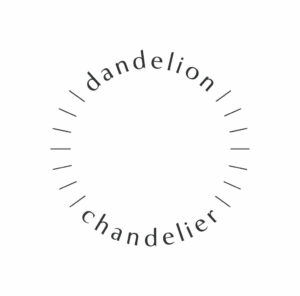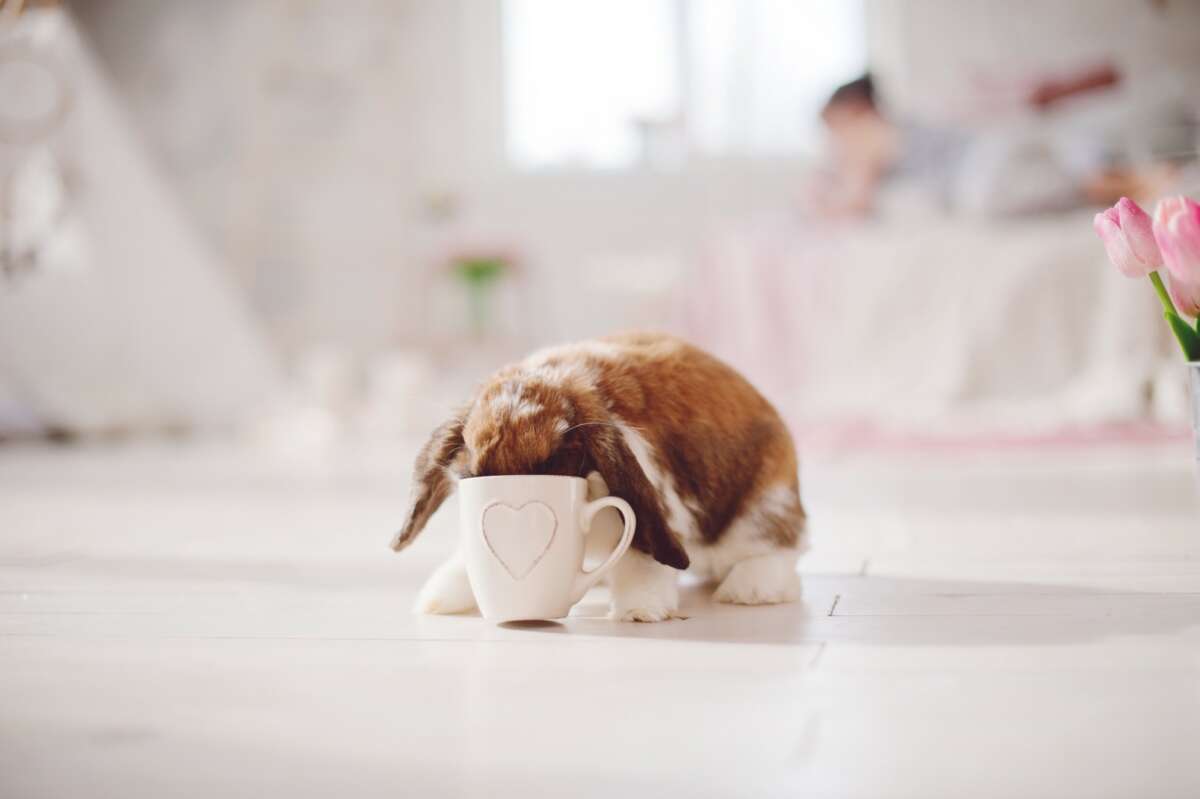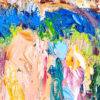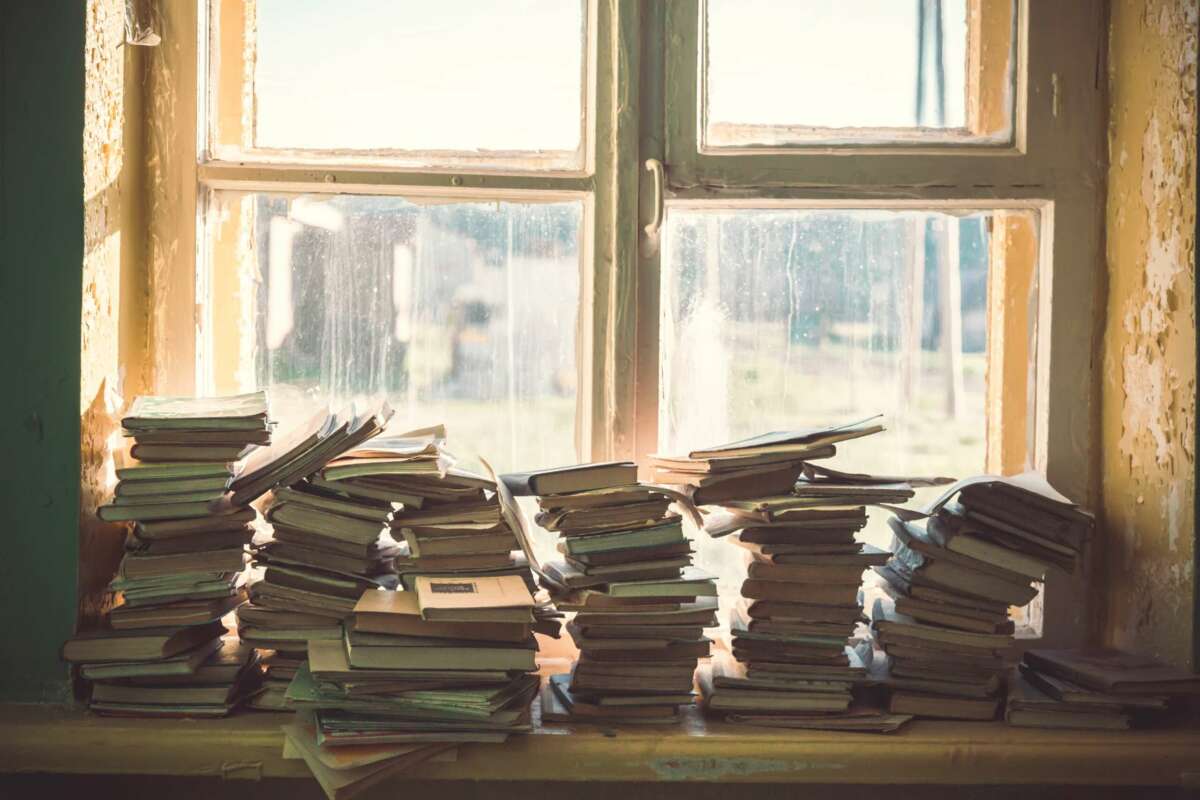New York City is coming back to life this fall after a brutal spell of loss and lockdown due to the coronavirus pandemic. The surest sign that there is reason for hope? Our favorite museums are open again! We recently visited the Museum of Modern Art (MoMA) and discovered a marvelous new textile art exhibit called Taking a Thread for a Walk. We love art museum exhibits devoted to textiles and weaving, and this one doesn’t disappoint. It’s a fascinating look at gender, race and class in the arts – and an uplifting vision of how a simple thread could connect all of humanity.
a golden age for textiles and weaving exhibits at art museums
Here at Dandelion Chandelier, we’re endlessly interested in textiles and art museum exhibits that feature works made of fiber, thread and yarn. Tapestries, fashionable apparel, home furnishings and abstract sculpture – we’re up for all of it.
[white_box]Join our community
For access to insider ideas and information on the world of luxury, sign up for our Dandelion Chandelier newsletter. And see luxury in a new light.
sign up now >
[/white_box]
Happily, the MoMA in New York has reopened after the Great Lockdown of the city. And there’s a textile display on! It’s a tightly curated small exhibit – but really enriching. And beautiful. We recently visited Taking a Thread for a Walk, and here’s what we saw.
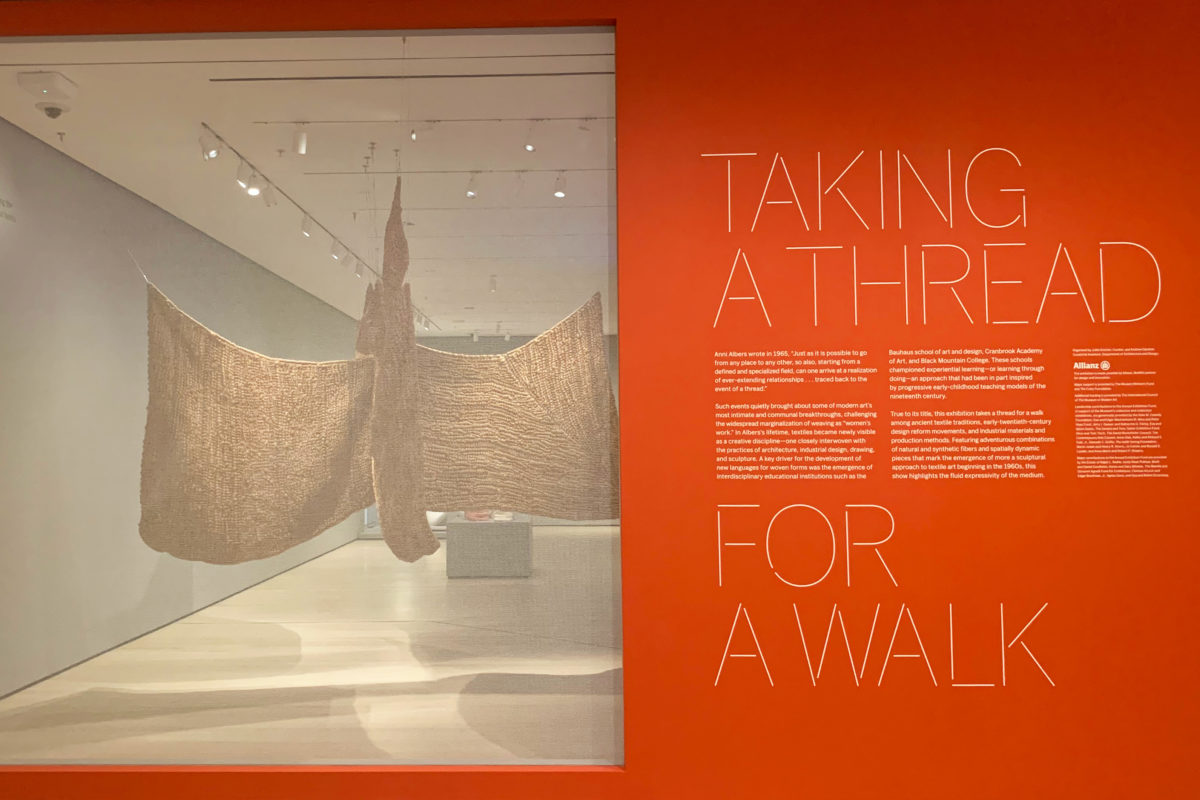
See the Stunning New Textile Art Exhibit at the MoMA. Photo Credit: Dandelion Chandelier.
Textiles have traditionally been relegated to the domestic sphere, described in condescending terms as “women’s work.” There are some who still argue that its craft, not art, and doesn’t deserve pride of place alongside painting, sculpture and photography. Thankfully, that’s a minority view.
And if you’re not persuaded, then you need to see this exhibit, dear reader.
[white_box]Related Post
outstanding exhibits on the art of weaving and textiles
read more >
[/white_box]
Highlights from Taking a Thread for a Walk textile exhibit at MoMA
the event of a thread
The exhibit’s curators, Juliet Kinchin and Andrew Gardner, begin with a 1965 quote from Anni Albers. “Just as it is possible to go from any place to any other, so also, starting from a defined and specialized field, can one arrive at a realization of ever-extending relationships . . . traced back to the event of a thread.”

See the Stunning New Textile Art Exhibit at the MoMA. Photo Credit: Dandelion Chandelier.
The curators’ notes teach us that over the course of Albers’ lifetime, textiles became newly visible as a creative discipline—one closely interwoven with the practices of architecture, industrial design, drawing, and sculpture. Leading the way were interdisciplinary educational institutions such as the Bauhaus School of Art and Design, the Cranbrook Academy of Art, and Black Mountain College.

See the Stunning New Textile Art Exhibit at the MoMA. Photo Credit: Dandelion Chandelier.
These schools championed experiential learning—or learning through doing—an approach that had been in part inspired by progressive early-childhood teaching models of the 19th century. They also blurred the lines between traditional art forms and encouraged a sense of exploration that yielded break-though cross-disciplinary works of art.

See the Stunning New Textile Art Exhibit at the MoMA. Photo Credit: Dandelion Chandelier.
If you pull on this thread (see what we did there?), you’ll learn that these works of art incorporate a wide array of influences and techniques: ancient textile traditions, early-20th-century design reform movements, and industrial materials and production methods. There are unexpected juxtapositions of natural and synthetic fibers. And some works display a sculptural approach to textile art that started in the 1960’s.
Commercial and purely aesthetic. Ancient and modern. Handmade and machine-made. Humble yet exalted – there are fascinating layers and contradictions in this exhibit – and also an important conversation about gender, race, class and art.
[white_box]Related Post
feeling the weight of Richard Serra’s Equal at the MoMA
read more >
[/white_box]
woven art can take many forms
The first (and last) works you see as a visitor to Taking a Thread for a Walk are two large works in the gallery outside the actual exhibit. One is by Sheila Hicks, perhaps the best known contemporary artist using textiles as a medium. The other is by Aurèlia Muñoz.

See the Stunning New Textile Art Exhibit at the MoMA. Photo Credit: Dandelion Chandelier.
The juxtaposition is a promise of what’s to come: a structured and taut formal semicircle in a neutral hue from Hicks. (We later learn that it’s a panel for the interior a 747 airplane). And a dimensional, loosely-formed, vibrant burnt orange work from Muñoz.
One expresses a certain kind of discipline and formal rigor. The other is sensual, freeform, and serpentine.
Meaning: there is no one way to make art from fiber. Explore and take a journey and you’ll be amazed at the range and depth of the works of art that are possible in the right hands.
[white_box]Related Post
the mystical magic of Betye Saar at the MoMA
read more >
[/white_box]
a great winged bird
The show-stopping, iconic work of the entire exhibit is a stunning woven piece by Aurèlia Muñoz entitled Águila Beige (Brown Eagle). Part of Muñoz’s 1974 Entities series, this new acquisition by the MoMA unites architecture and fiber art. The artist crafted it by hand, using macramé knotting.

See the Stunning New Textile Art Exhibit at the MoMA. Photo Credit: Dandelion Chandelier.
Suspended from the ceiling, the work evokes birds in flight, or dreams rising up from the earth, or blessings descending from heaven.
It could be a magic carpet. A shroud. A comforter.
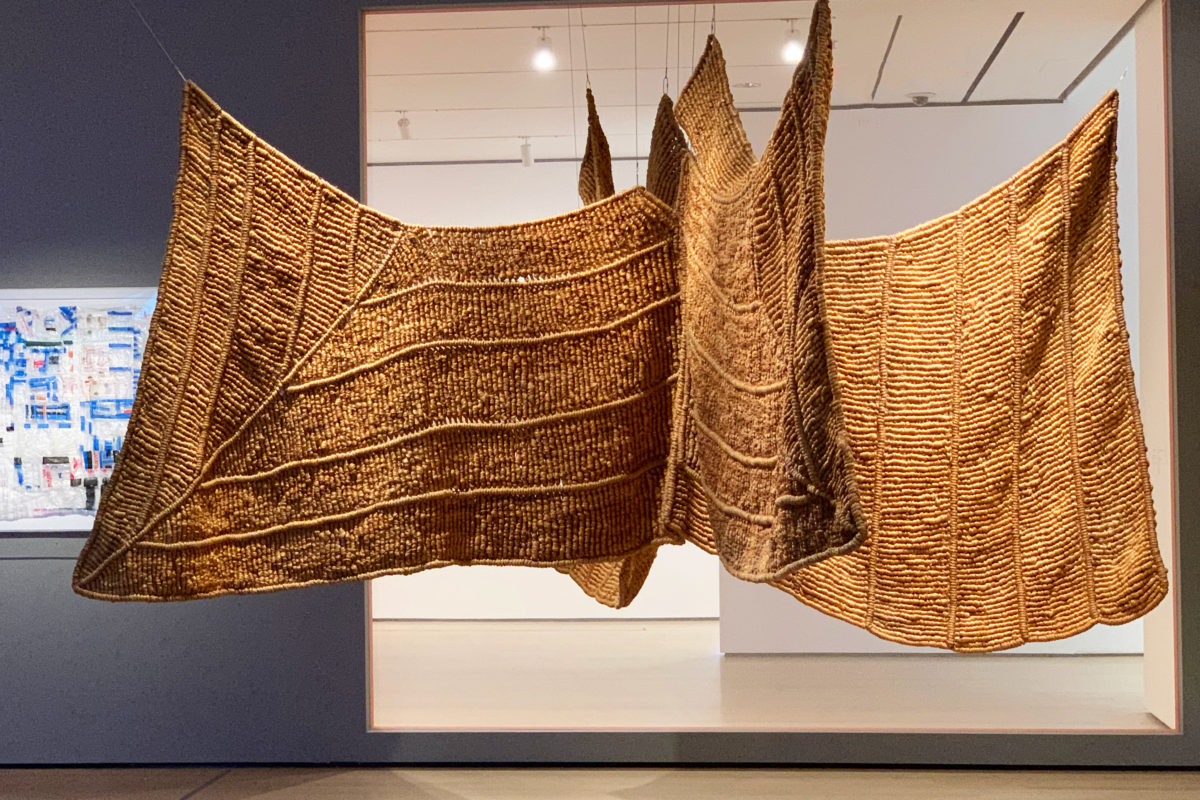
See the Stunning New Textile Art Exhibit at the MoMA. Photo Credit: Dandelion Chandelier.
It’s a shame we can’t touch it, because the texture is what we used to call in the apparel business “yummy.” It’s hard not to reach out and squeeze it: is it hard or soft? We later learn that its made of jute and sisal – so most probably hard.
[white_box]Related Post
an enchanted electric rainforest at the MoMA
read more >
[/white_box]
weaving as “women’s work”
From there, we’re drawn into the history of textile-making and the economic, sociological, and historic significance of the technique. We’re introduced to the idea that “weaving is women’s work” by Edouard Vuillard’s vibrant portrait of a weaver at work.
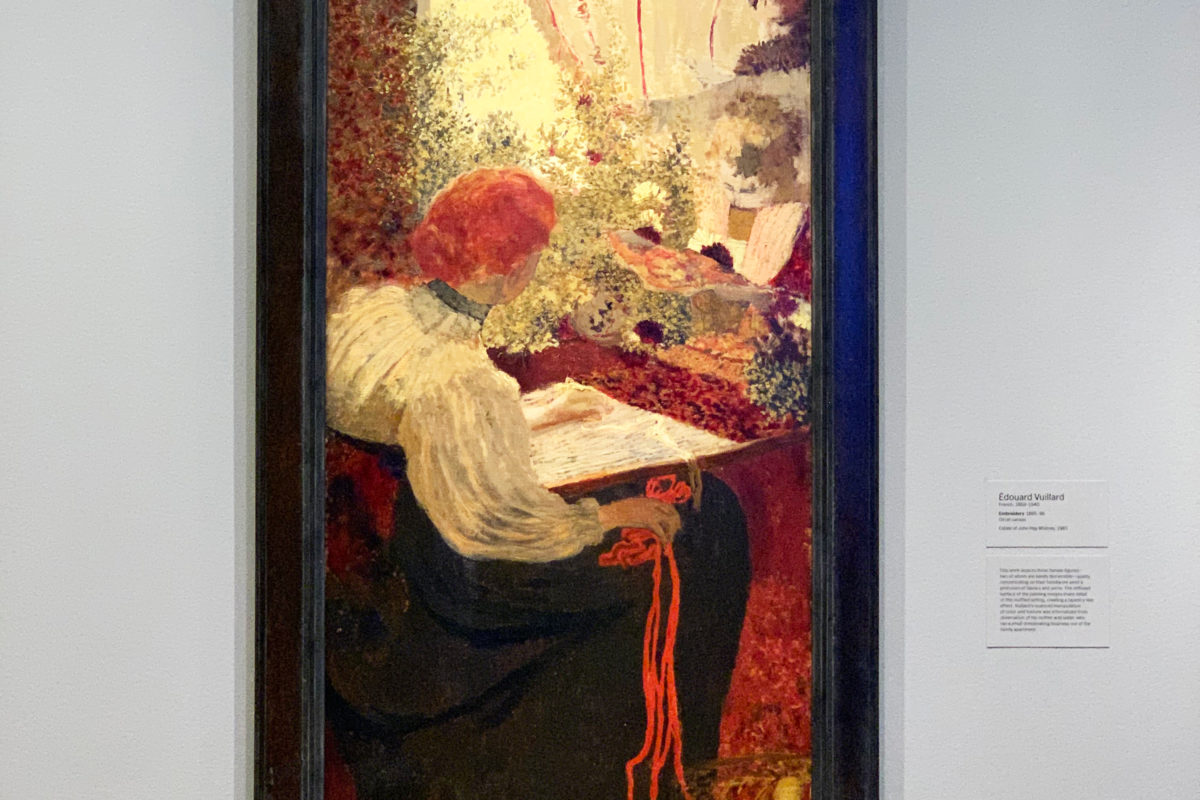
See the Stunning New Textile Art Exhibit at the MoMA. Photo Credit: Dandelion Chandelier.
The textile industry was a significant employer in America for nearly a century, and we witness how the traditional domestic process of weaving became increasingly industrialized.
Interestingly, as it was becoming a commodity, though, weaving and textiles were also beginning to be considered as another medium for creative expression. Just like paper or stone.
light and shadow
Lynn Alexander’s Decorated Panel c.1954 is draped like a long gossamer web that casts lovely shadows that look just like lace. Or light filtering through a leafy tree branch.
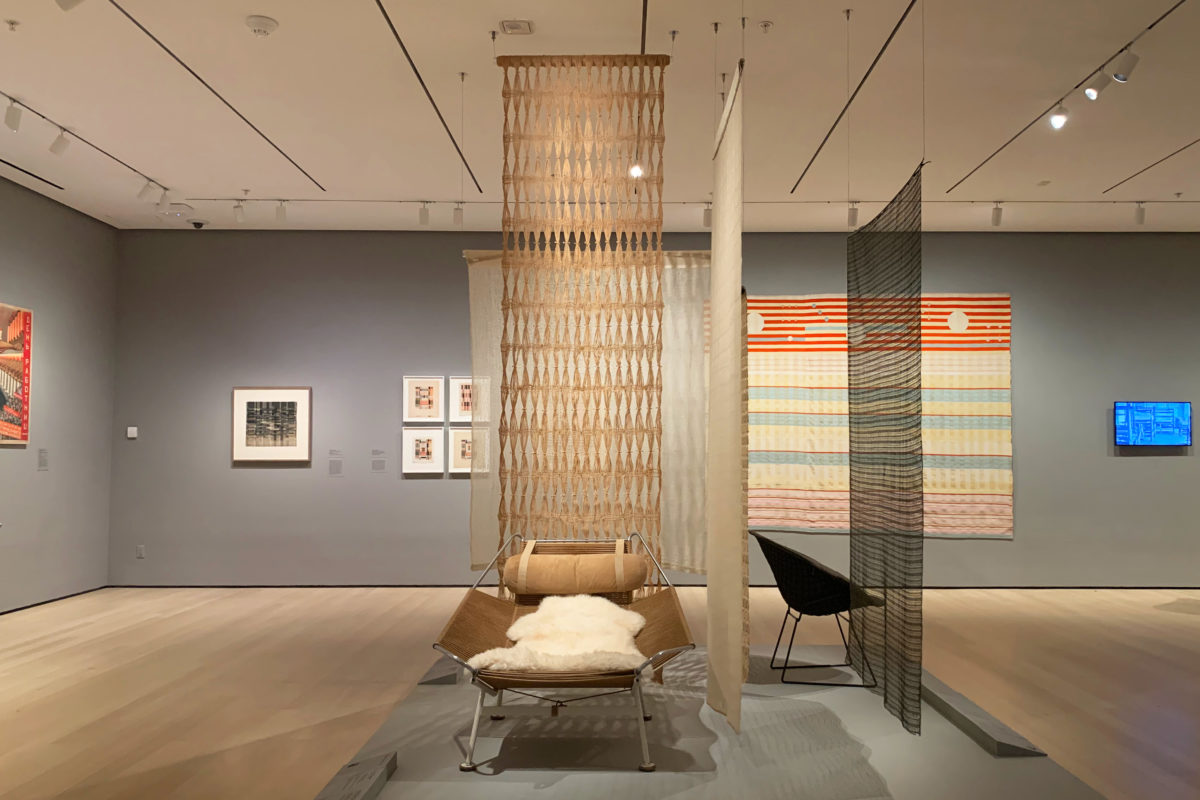
See the Stunning New Textile Art Exhibit at the MoMA. Photo Credit: Dandelion Chandelier.
The work reminded us of the sculpture currently on the roof of the Met, Héctor Zamora’s Lattice Detour. It also casts striking shadows. And also seeks to express the veins of connectedness that can unite us in common cause.

One of the best textiles and weaving art museum exhibits: Taking a Thread for a Walk at MoMA. Photo Credit: Dandelion Chandelier.
functional furniture
Far from being purely decorative, the exhibit also demonstrates how fanciful but functional objects can also be crafted from textiles and fiber.
Bruno Munari’s Falkland Hanging Lamp (1964) is made of elasticized fabric, illuminating how many ways a thread can be deployed in the service of art and design.
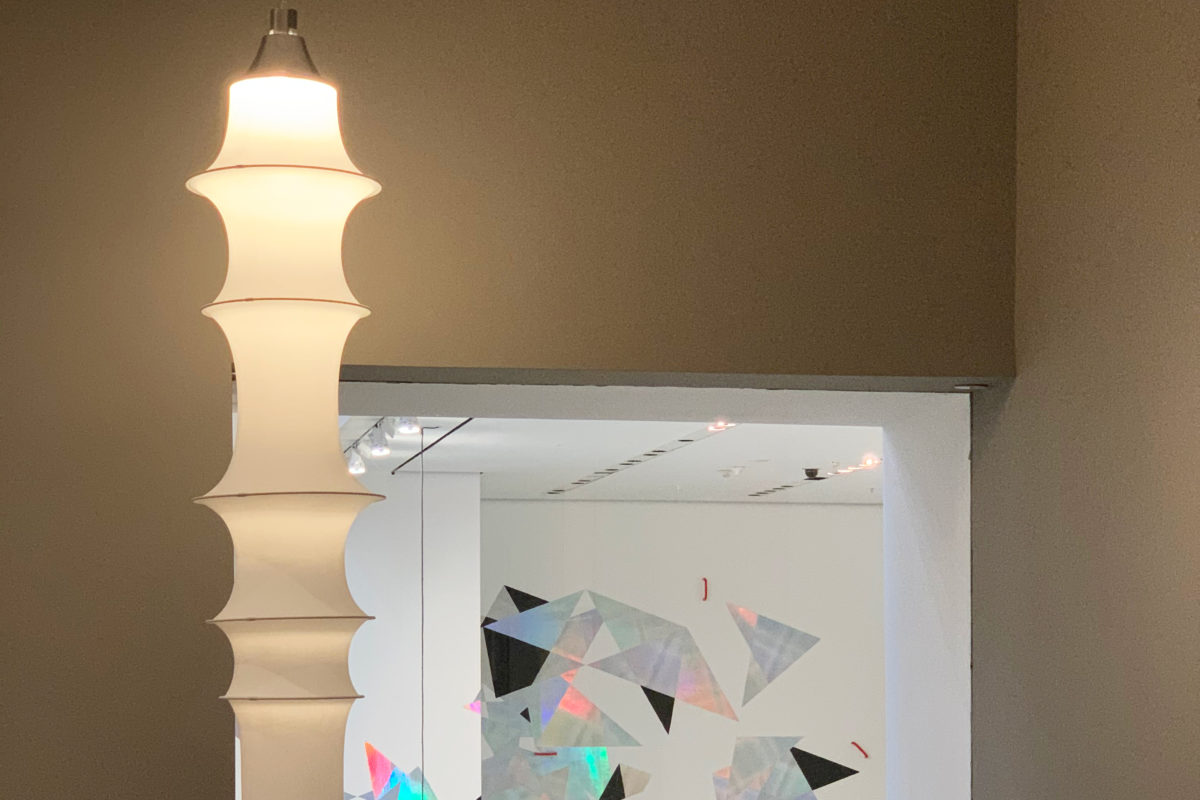
See the Stunning New Textile Art Exhibit at the MoMA. Photo Credit: Dandelion Chandelier.
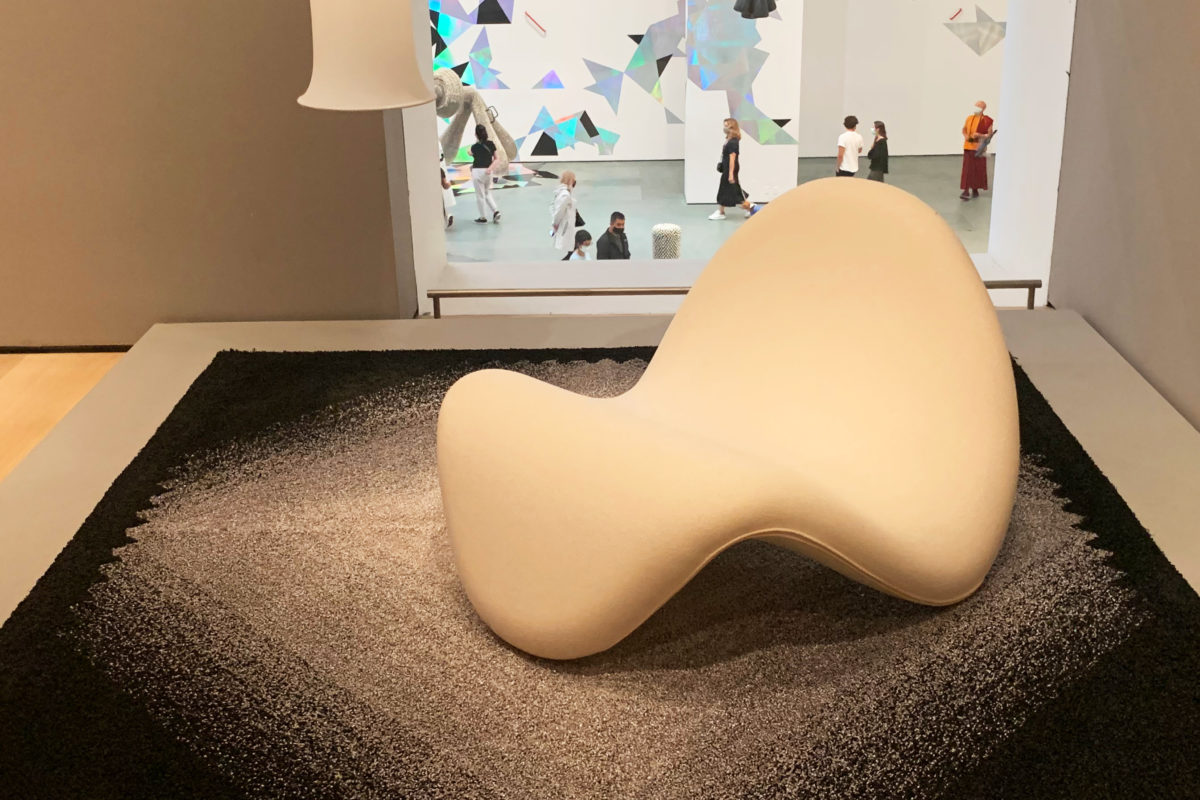
See the Stunning New Textile Art Exhibit at the MoMA. Photo Credit: Dandelion Chandelier.
Related Post
the magic of the sculpture garden at the MoMA
read more >
[/white_box]
Finally, another of our favorites in this exhibit is a 1953 wool tapestry woven by Le Corbusier entitled Les Musiciennes. The artist intended to push the boundaries of architecture, art and decorative objects. The curators’ notes explain that Le Corbusier viewed tapestry as “the mural of the modern age.” He called these works “Muralnomads” and expressly hoped that they would be “easily detached, rolled, carried under one’s arm and hung elsewhere,” just like tapestries once were.
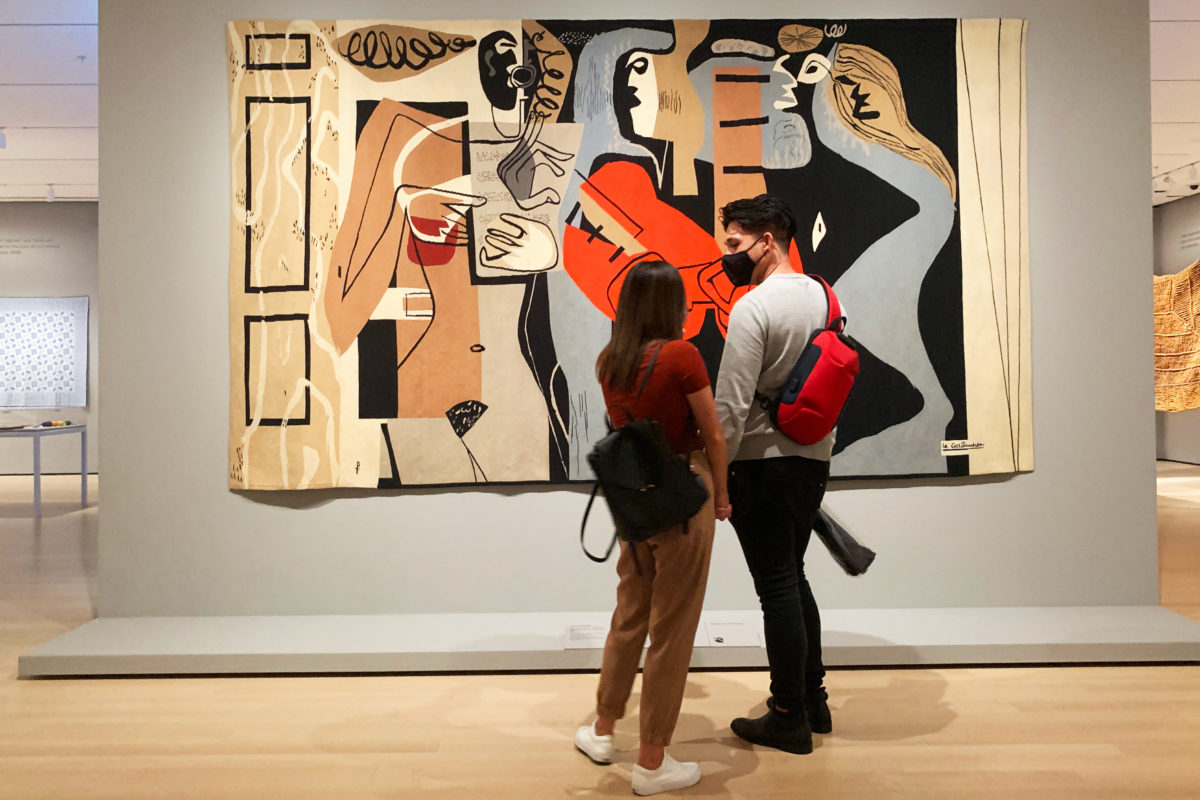
One of the best textiles and weaving art museum exhibits: Taking a Thread for a Walk at MoMA. Photo Credit: Dandelion Chandelier.
textiles and weaving exhibits at art museums
There are undoubtedly more and more art museum exhibits showcasing textiles and weaving, and we hope that there will be even more as the Great Lockdown eases its icy grip. And we hope that more people will see and explore them. ‘Cause is it pure coincidence that while we were at Taking a Thread for a Walk, every visitor to this exhibit was female, with the exception of a couple of hetero couples?
Women’s work, indeed. We’re pretty sure that the gents are welcome, too – so come on by anytime, dudes.
Taking a Thread for a Walk continues at MoMA New York through January 10, 2021.
join our community
For access to insider ideas and information on the world of luxury, sign up for our Dandelion Chandelier Newsletter here. And see luxury in a new light.
